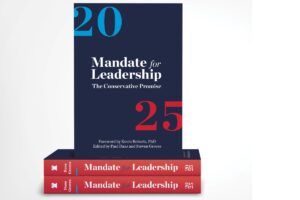Editor’s note: today Jack Bernard writes part three of three -part series looking at Project 2025 and what it would mean if this program guided the next Trump Administration.—eeb)
By Jack Bernard, contributing columnist
Part three of three
PEACHTREE CITY, Ga. | This final article spells out the way that the Trump administration would approach major policy areas. Although the Trump campaign has taken great pains to distance itself from Project 2025, it was written by previous Trump appointees. If he is elected, it will undoubtedly be the basis for quickly seeking to reorganize the federal government, to the detriment of taxpayers.
 Our well-established, decentralized public school system is the envy of much of the world. But Project 2025 states: “Schools serve parents, not the other way around…the best argument for universal school choice.” (page 5). It says this view is “non-negotiable.” Thus, our public education system would be undercut in favor of a stronger private sector presence, benefiting the wealthy and special interests, including a major increase in our tax money going to religiously affiliated schools.
Our well-established, decentralized public school system is the envy of much of the world. But Project 2025 states: “Schools serve parents, not the other way around…the best argument for universal school choice.” (page 5). It says this view is “non-negotiable.” Thus, our public education system would be undercut in favor of a stronger private sector presence, benefiting the wealthy and special interests, including a major increase in our tax money going to religiously affiliated schools.
Public education is not designed for parents. The goal is to educate children in a non-political, non-partisan manner while achieving optimum results. Following what is said by small groups of radicalized parents is not objective. It would result in politicalization of education to the detriment of our children. Radical views, based on emotion rather than fact, should not be taught in public schools.
Project 2025 believes our education system promotes “Marxist academics, as it says on page 16.” It brings up “critical race theory,” a frequent Boogey Man of the far right. However, critical race theory is only taught in a few law schools, not in k-12.
What these conservatives are really saying is that they do not want “divisive concepts,” like the history of black people in America, taught to their children.
 The U.S. Department of Education (page 330) would be abolished via a “Department of Education Reorganization Act,” which would “devolve the agency.” It would (Page 360) also cut federal allocations going to states by “$17 billion annually.” Under Project 2025, student aid is also slashed. For example, on page 341, it says: “no interest rate subsidies or loan forgiveness.”
The U.S. Department of Education (page 330) would be abolished via a “Department of Education Reorganization Act,” which would “devolve the agency.” It would (Page 360) also cut federal allocations going to states by “$17 billion annually.” Under Project 2025, student aid is also slashed. For example, on page 341, it says: “no interest rate subsidies or loan forgiveness.”
Government regulations have been put in place to protect taxpayers from self-interested entities, such as big business and financial institutions. But the 2025 plan is to severely limit the ability of the federal government to intervene via business regulations, enabling big business to thrive to the detriment of taxpayers. And that includes promoting fossil fuels, further ruining our environment.
Regulatory oversights are often put in place after a severe financial crisis caused by irresponsible financial institutions. Ignoring relatively recent history, Project 2025 wants to “repeal Title I, Title II, and Title VIII of the Dodd–Frank Act.”(The Dodd-Frank Act prevents excessive risk-taking that led to the financial crisis.) The rationale is that the federal government should not impose “stringent regulation” of these too-big-to-fail financial institutions (page 705). Thus, the Trump administration would set us up for a financial catastrophe, while maintaining that it had no control over the situation. The fiscal equivalent of Trump’s response to the Covid-19 pandemic.
Project 2025 was put together by the Heritage Foundation. Its contributors include 140 people who were Trump administration officials.
Project 2025 is a radical restructuring of our government. It provides a step-by-step, detailed plan as to how the Trump administration can, and will, put the welfare of big business and special interests before that of our citizens. The resulting negative effects of Project 2025 will be even worse than the 2017 Trump tax cuts for the wealthy and corporations which created the largest debt in US history.
Go read further about Project 2025, so you will be aware of it before voting in November.
- Have a comment? Click here to send an email.









Follow Us